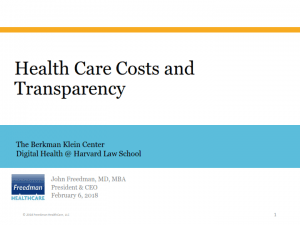Health Care Cost and Transparency in the Digital Age
I recently participated in the Digital Health @ Harvard series, which features speakers from Harvard as well as other collaborators and colleagues. The goal is to bring together those that work in the intersection between health and technology, a world the series has coined the “digital health ecosystem.” Discussion topics highlight new developments and identify opportunities for collaboration.
I spoke largely about health care price inflation and price variation, who’s benefiting, who’s not and how data is being aggregated and shared.
As I mentioned in the recent blog post, “It’s All About Price,” health care prices are the major driver of U.S. health care costs. This presentation builds on that discussion with additional data showing dramatic variation in prices for certain procedures and how higher-priced providers are gaining market share.
The question for states with aggregated health care data and the providers, purchasers and consumer advocates operating in those states is how they will harness this data to create more effective health care markets.
Some of the data I referenced in the presentation is derived from an important use case for this type of transparency, the Massachusetts’ Attorney General’s Examination of Health Care Cost Trends and Cost Drivers reports. For several years, FHC has worked with the Health Division of the AGO to develop and review extensive quantitative and qualitative analyses of the quality, cost, and key market factors of the hospitals and major physician groups in Massachusetts. Through the reports, this data is used to evaluate the state’s health care market and guide decision making.
To learn more about the Digital Health @ Harvard series, visit the Berkman Klein Center for Internet & Society at Harvard University, which cosponsors the event along with Petrie-Flom Center for Health Law Policy, Biotechnology, and Bioethics at Harvard Law School.

